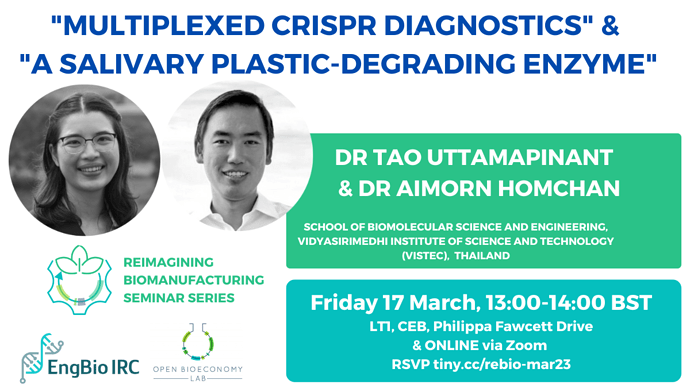Join us in CEB for the next two talks in the Open Bioeconomy Lab “Reimagining Biomanufacturing” Event Series.
You can forward this email or repost via Twitter and LinkedIn if you think it would be of interest to your network.
“Multiplexed CRISPR diagnostics” & “A salivary plastic-degrading enzyme”
Speakers: Dr Aimorn Homchan & Dr Tao Uttamapinant, School of Biomolecular Science and Engineering, Vidyasirimedhi Institute of Science and Technology (VISTEC), Rayong, Thailand.
When: Fri 17 March, 1-2pm BST, followed by tea & coffee in the CEB atrium
Location: Lecture Theatre 1, Dept of Chemical Engineering and Biotechnology, Philippa Fawcett Drive, Cambridge, CB3 0AS
Register via Zoom for online attendance >>
Abstracts
Multiplexed CRISPR diagnostics will discuss our development of a robust multiplexed CRISPR-based detection using orthogonal CRISPR-associated enzymes to simultaneously diagnose SARS-CoV-2 infection and pinpoint the causative SARS-CoV-2 variant of concern (VOC)—including recent globally dominant VOCs, as well as our implementation, with approval of the FDA of Thailand, of the CRISPR-based test technology. To enable sustainable use of the technology in LMICs, we produce and formulate our own recombinase polymerase amplification reaction, demonstrate its equivalent efficiency to commercial counterparts, and pave way for further engineering of the reaction.
A salivary plastic-degrading enzyme covers our lab’s contributions toward bioremediation and green upcycling of plastics. We discover a new polyethylene terephthalate (PET) hydrolase, which we called MG8, from the human saliva metagenome. MG8 has robust PET plastic degradation activities under different salinity and temperature conditions, outcompeting several naturally occurring and engineered hydrolases in degrading PET. To expand functionalities of MG8, we genetically encode 2,3-diaminopropionic acid (DAP) in place of the catalytic serine residue of MG8, thereby converting a PET-degrading enzyme into a covalent binder of PET. We show that MG8(DAP) can be used to attach protein cargos to PET, serving as a modular platform for bio-functionalisation of PET and polyesters.
Talks will be uploaded to the OBL youtube channel for those who cannot attend on the day:
